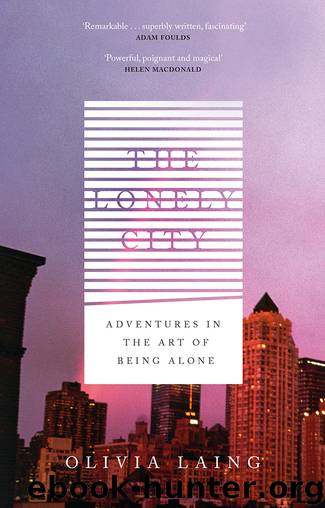The Lonely City by Olivia Laing

Author:Olivia Laing
Language: eng
Format: epub, mobi
Publisher: Canongate Books
It was hard to square that statement with the things I’d seen: folder after folder attesting to creative decisions, to choices made and problems solved, though if I’d never read anything by David Wojnarowicz, I might have been more likely to accept it. But the Darger story looks different if you are familiar with Wojnarowicz, which is to say familiar with issues of violence and abuse, of poverty and the devastating effects of shame. Wojnarowicz was a courageous and eloquent advocate for his own work, but the things he said about himself, about his motivations and intentions, also have wider applications. At the very least, they ought to make one ask questions about agency and class and power in the work of vulnerable or socially excluded artists.
You can’t think about people like Darger, or Solanas, for that matter, without thinking too about the damage society wreaks upon individuals: the role that structures like families and schools and governments play in any single person’s experience of isolation. It’s not only factually incorrect to assume mental illness can entirely explain Darger; it’s also morally wrong, an act of cruelty as well as misreading. One of the saddest and most telling things in all his work is the declaration of child independence he wrote for the Realms. Among the rights he chose are: ‘to play, to be happy, and to dream, the right to normal sleep of the night’s season, the right to an education, that we may have an equality of opportunity for developing all that are in us of mind and heart’.
How many of those rights had he actually been granted in his own life? The one that really got me was the right to an education. It underscored the brutal, careless way that he’d been treated. You can destroy a person without resorting to the graphic violence of the Realms; can crush hopes and squander dreams, waste talent, refuse to train and educate an able mind, but rather keep a person in a prison of work, without praise or prospects, and certainly unable to develop what is in them of mind and heart. Extraordinary, in this light, that Darger managed to create so much, to leave such luminous traces in his wake.
What MacGregor saw in Darger’s work was a compulsive and sexualised desire to cause pain. He believed that his identification was with the men who choked and hung and slaughtered the defenceless, naked girls. Other critics have suggested that on the contrary he was compulsively replicating traumatic scenes of his own abuse. Perhaps both are true, since it is very rare that any single act occurs for just one motive. At the same time, what this leaves out is the possibility that Darger was actually carrying out a conscious and courageous investigation into violence: what it looks like; who its victims and perpetrators are. Bigger questions, too: like what it means to suffer, and whether anyone can truly understand the existence of another person’s internal world.
For me, they were
Download
This site does not store any files on its server. We only index and link to content provided by other sites. Please contact the content providers to delete copyright contents if any and email us, we'll remove relevant links or contents immediately.
| France | Germany |
| Great Britain | Greece |
| Italy | Rome |
| Russia | Spain & Portugal |
Fanny Burney by Claire Harman(25855)
Empire of the Sikhs by Patwant Singh(22269)
Out of India by Michael Foss(16372)
Leonardo da Vinci by Walter Isaacson(12046)
Small Great Things by Jodi Picoult(6193)
The Six Wives Of Henry VIII (WOMEN IN HISTORY) by Fraser Antonia(4869)
The Wind in My Hair by Masih Alinejad(4485)
The Lonely City by Olivia Laing(4189)
The Crown by Robert Lacey(4177)
A Higher Loyalty: Truth, Lies, and Leadership by James Comey(4110)
The Iron Duke by The Iron Duke(3711)
Millionaire: The Philanderer, Gambler, and Duelist Who Invented Modern Finance by Janet Gleeson(3660)
Sticky Fingers by Joe Hagan(3510)
Alive: The Story of the Andes Survivors by Piers Paul Read(3378)
Papillon (English) by Henri Charrière(3370)
Joan of Arc by Mary Gordon(3357)
Stalin by Stephen Kotkin(3166)
Aleister Crowley: The Biography by Tobias Churton(3083)
Ants Among Elephants by Sujatha Gidla(2978)
